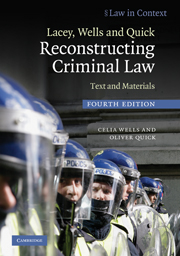Book contents
- Frontmatter
- Contents
- Preface
- Table of cases
- Table of statutes
- Section I Approaching Criminal Law
- Section II Law, Order and Security
- Section III Interpersonal Violence; Drugs and Alcohol Abuse; Offence Preparation and Participation
- Section IV Property and Propriety
- Section V Regulating Sexuality and Bodily autonomy
- 14 The Social Construction of Sexuality and Bodily Autonomy
- 15 Sexual Violence
- 16 Regulating Sexuality
- 17 Criminalising Healthcare Choices
- Section VI Making a Killing
- Bibliography
- Index
- References
16 - Regulating Sexuality
from Section V - Regulating Sexuality and Bodily autonomy
Published online by Cambridge University Press: 05 June 2012
- Frontmatter
- Contents
- Preface
- Table of cases
- Table of statutes
- Section I Approaching Criminal Law
- Section II Law, Order and Security
- Section III Interpersonal Violence; Drugs and Alcohol Abuse; Offence Preparation and Participation
- Section IV Property and Propriety
- Section V Regulating Sexuality and Bodily autonomy
- 14 The Social Construction of Sexuality and Bodily Autonomy
- 15 Sexual Violence
- 16 Regulating Sexuality
- 17 Criminalising Healthcare Choices
- Section VI Making a Killing
- Bibliography
- Index
- References
Summary
The orthodox separation of sexual offences into consensual and non-consensual offences significantly shapes legal images of sexuality. Yet, as we have seen, the question of consent in adult sexual relationships is a contested one. Duncan notes that:
…the power of the criminal law in respect of physical and sexual violence is not merely or even mainly juridical, but, more importantly, disciplinary. As a disciplinary power, these aspects of the law's text demarcate the boundary between the normal and the abnormal and, in doing so, they define the normal around the notion of the heterosexual male subject in two principal ways: first, by a concept of consent which is very differently constructed as between offences and, secondly, by a subtext of visibility which privileges visible physical violence over (often) invisible sexual violence. The law disciplines bodies differentially as between different genders and different sexual orientations
[Duncan 1995, p. 326].The extraordinary number of different offences, albeit most now gathered in the Sexual Offences Act 2003, testifies to the confusions besetting what are regarded as appropriate legal and social responses in this area. What is the connection between sexual activity between two 15-year-olds and the persistent sexual abuse of a small child by a relative? Is child sexual abuse an abuse of sexual autonomy, or of trust, or of physical security, or all three?
- Type
- Chapter
- Information
- Lacey, Wells and Quick Reconstructing Criminal LawText and Materials, pp. 540 - 595Publisher: Cambridge University PressPrint publication year: 2010



